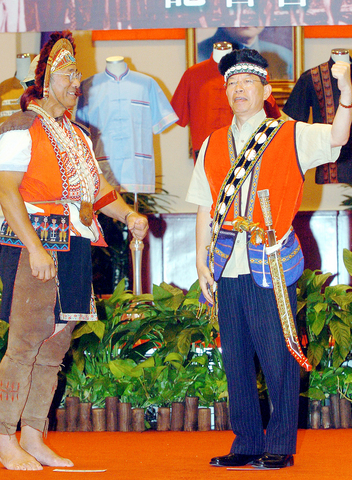At a press conference yesterday in Taipei to announce that Aug. 1 will be henceforth be "Indigenous People's Re-designation Day," Premier Frank Hsieh (
"I have no idea which tribe my great-grandmother belonged to," the premier said. "However, I think she must have been Bunun because whenever I hear Bunun music, I become excited and emotional."
The Cabinet has set aside the special day to accentuate its determination to preserve Aboriginal cultures and ways of life and to boost their well-being.

PHOTO: LO PEI-DER, TAIPEI TIMES
Many members of Taiwan's indigenous tribes were called "mountain people," which carried a derogatory connotation. They were not re-designated as "indigenous peoples" to appropriately reflect their ethnic origins until the 1990s.
Hsieh showed up at the press conference in the Tsou Tribe's traditional outfit. In the meantime, a Tsou tribal chieftain decorated the premier with a headband and a special knife. The Tsou chieftain also gave Hsieh a Tsou tribal name.
Many other Cabinet members attending the news conference yesterday were also given a Tsou tribal name.
Indigenous people were forced to take Mandarin names and were deprived of other rights during the martial law era of Chinese Nationalist Party's (KMT) rule. Hsieh said that the government has been working hard to correct past wrongs and make sure they are never repeated.
The premier promised that the Cabinet will continue to improve welfare services for Aborigines in line with the principle of "giving priority to caring for the underprivileged."

Taiwan is stepping up plans to create self-sufficient supply chains for combat drones and increase foreign orders from the US to counter China’s numerical superiority, a defense official said on Saturday. Commenting on condition of anonymity, the official said the nation’s armed forces are in agreement with US Admiral Samuel Paparo’s assessment that Taiwan’s military must be prepared to turn the nation’s waters into a “hellscape” for the Chinese People’s Liberation Army (PLA). Paparo, the commander of the US Indo-Pacific Command, reiterated the concept during a Congressional hearing in Washington on Wednesday. He first coined the term in a security conference last

Prosecutors today declined to say who was questioned regarding alleged forgery on petitions to recall Democratic Progressive Party (DPP) legislators, after Chinese-language media earlier reported that members of the Chinese Nationalist Party (KMT) Youth League were brought in for questioning. The Ministry of Justice Investigation Bureau confirmed that two people had been questioned, but did not disclose any further information about the ongoing investigation. KMT Youth League members Lee Hsiao-liang (李孝亮) and Liu Szu-yin (劉思吟) — who are leading the effort to recall DPP caucus chief executive Rosalia Wu (吳思瑤) and Legislator Wu Pei-yi (吳沛憶) — both posted on Facebook saying: “I

Sung Chien-liang (宋建樑), who led efforts to recall Democratic Progressive Party (DPP) Legislator Lee Kun-cheng (李坤城), was released on bail of NT$80,000 today amid outcry over his decision to wear a Nazi armband to questioning the night before. Sung arrived at the New Taipei District Prosecutors’ Office for questioning in a recall petition forgery case last night wearing a red armband bearing a swastika, carrying a copy of Adolf Hitler’s Mein Kampf and giving a Nazi salute. Sung left the building at 1:15am without the armband and covering the book with his coat. Lee said today that this is a serious

A mountain blaze that broke out yesterday morning in Yangmingshan National Park was put out after five hours, following multi agency efforts involving dozens of fire trucks and helicopter water drops. The fire might have been sparked by an air quality sensor operated by the National Center for High-Performance Computing, one of the national-level laboratories under the National Applied Research Laboratories, Yangmingshan National Park Headquarters said. The Taipei City Fire Department said the fire, which broke out at about 11am yesterday near the mountainous Xiaoyoukeng (小油坑) Recreation Area was extinguished at 4:32pm. It had initially dispatched 72 personnel in four command vehicles, 16